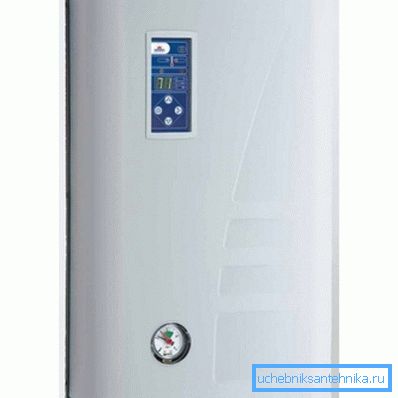Electric boiler for home heating - common options
Comfortable atmosphere in the house is unthinkable without the organization of competent heating. The rising price of natural resources and recurring economic crises make you think about cost savings. In this regard, many people are increasingly paying attention to electric boilers for home heating.
Of course, our electricity is also not free, but the heating of a country house with an electric boiler often becomes the best option, since it is not always possible to build a gas main. And imported solid or liquid fuel costs no less than electricity.
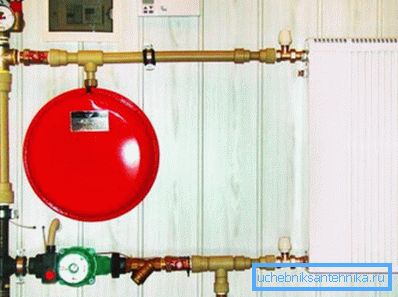
Plus, equipment for such types of fuel costs serious money and special permits are needed for it, which entails additional inconveniences.
Advantages and disadvantages of electrical units
- Speaking about the advantages of this type of equipment, the first thing that can be discussed is the relatively low price of the equipment itself.. Gas or solid fuel units are several times more expensive than electric ones.
- Any good owner who is familiar with a school course in physics will be able to install equipment operating from the 220V network in the country or in a small private house.. Instructions to the apparatus contains several elementary step-by-step actions.
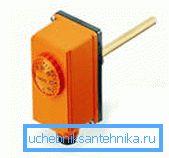
- Even a teenager will be able to operate the electric heating boiler for the house. If the installation was done correctly, then the system can be set up to work in the desired mode in a couple of minutes, most of the units being controlled by automation and do not require constant monitoring.
- Electric heating boilers for home or cottage do not require a boiler room, they can be mounted anywhere in the dwelling. The largest units can easily be hidden in a wall cabinet. And such equipment as electrode boilers, for example, devices of the company Galan, generally crashes into the system and have a diameter slightly larger than the pipes of heating wiring.
- An important factor is the environmental cleanliness of the equipment., electric heating boilers for a private house do not need a chimney, in addition, all units work almost silently.
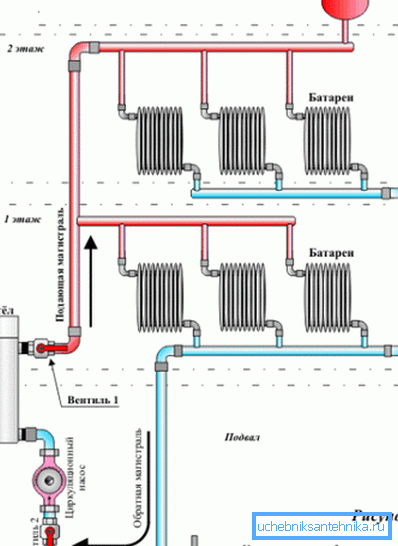
As is well known in the material world absolutely perfect things, in principle, does not exist.
Heating a private house or apartment with electricity also has its disadvantages.
- The first significant minus is the price of electricity itself. How not to try the work of such a boiler will cost more than heating with natural main gas, therefore the organization of heating large cottages solely with electricity is not profitable. Often this option is beneficial for small houses or cottages.
- Electric heating boilers for the home are completely dependent on the stability of the power supply, in those places where long-term interruptions occur, such equipment is not very effective.
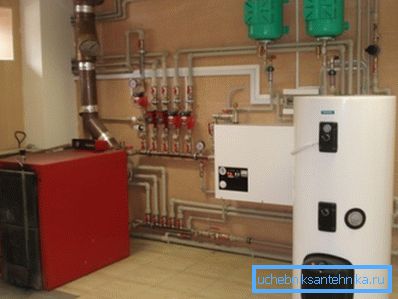
Important: to some extent, it can be considered a minus that from a household network of 220 V units with a capacity of up to 6 kW can operate. For more serious equipment, a separate three-phase line with an operating voltage of 380 V is required.
Types of existing units
Any unit converts electrical energy into thermal energy. But here are ways to heat the liquid coolant are different. In particular, they share the 3 most common principles of operation, these are Tenovye, electrode and induction devices.
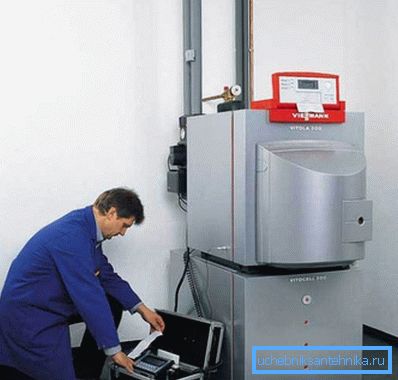
In addition, electric heating boilers for a private house can have one or two circuits. In the first case, only the building is heated, in the second, still water is heated for domestic needs. There are also wall and floor units.
Tip: sometimes you hear that some manufacturer, using some unimaginable technology, increased the efficiency of the unit by a large number of percent. So the efficiency of all electric boilers ranges from 95 to 98%. All other statements are in the field of advertising and marketing.
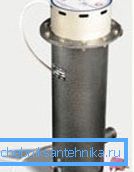
Tenovye units
This type of equipment appeared the very first. Simply put, then work TENovye electric boilers for heating a private house on the principle of a simple electric kettle. A closed heating element is heated by its own resistance and, being in a tank, gives up energy to the coolant circulating in the system.
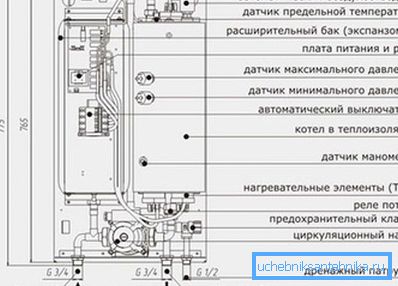
The technology is simple and clear, long-term operation has shown the reliability of such equipment. The units are attractive for their simplicity and unpretentiousness. As the heat carrier any liquid intended for this purpose can be used.
They are one and two-circuit. The sensor system provides battery life. Among the shortcomings, you can point to the solid dimensions and the deposition of scale on the tenes.
Electrode units
Heating a private house with electrode boilers is undoubtedly a more advanced technology. The heating process here occurs due to the resistance of the coolant itself. The electrodes are located directly inside the system and are in contact with water.
Water, as is well known, is a conductor and, like any conductor located in an alternating current circuit, inevitably heats up, due to this heating and operation of the unit.
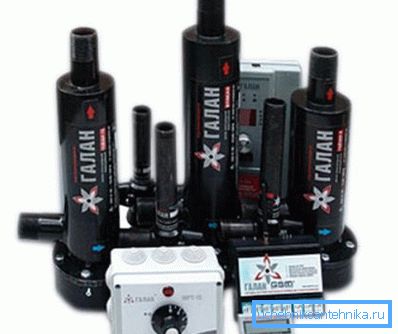
Such equipment is considered the most compact, the diameter of the housing of the unit is not much larger than the carrier pipe in the heating system. In contrast to the heaters, such devices do not require a sensor for the absence of liquid, if the water is drained, the boiler will simply stop working. The price of such boilers, in comparison with competitors is not large, but the power that one unit can produce is also limited.
Induction units
Induction electric boilers for home heating, are the development of the last decades. No direct contact of the electrodes or heaters with the liquid is not carried out. The unit operates by induction heating of the structures made of ferrimagnetic alloys. Such a system is somewhat similar to the work of a transformer, heating is carried out due to the heat transfer from the secondary winding.
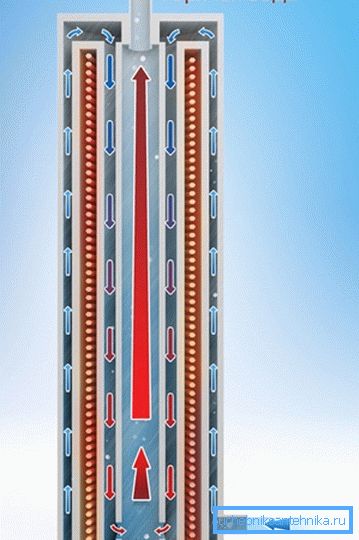
This approach allows the use of any type of coolant, while scale does not settle on the pipes of the unit itself. Plus, the management and control system of such boilers is much more perfect. But, unfortunately, such equipment is quite expensive and has serious dimensions.
The video presents an overview of electric boilers.
Conclusion
All options are good in their own way. When choosing a unit, you must first of all be guided by the size of the room in which it will be installed and its functional orientation. In any case, if in doubt, it is better to consult a specialist.
